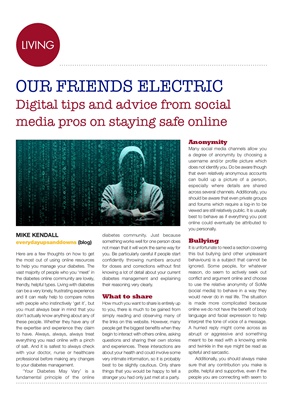
LIVINGLIVING
OUR FRIENDS ELECTRIC
Digital tips and advice from social
media pros on staying safe online
Here are a few thoughts on how to get
the most out of using online resources
to help you manage your diabetes. The
vast majority of people who you 'meet' in
the diabetes online community are lovely,
friendly, helpful types. Living with diabetes
can be a very lonely, frustrating experience
and it can really help to compare notes
with people who instinctively 'get it', but
you must always bear in mind that you
don't actually know anything about any of
these people. Whether they have any of
the expertise and experience they claim
to have. Always, always, always treat
everything you read online with a pinch
of salt. And it is safest to always check
with your doctor, nurse or healthcare
professional before making any changes
to your diabetes management.
'Your Diabetes May Vary' is a
fundamental principle of the online
diabetes community. Just because
something works well for one person does
not mean that it will work the same way for
you. Be particularly careful if people start
confidently throwing numbers around
for doses and corrections without first
knowing a lot of detail about your current
diabetes management and explaining
their reasoning very clearly.
What to share
How much you want to share is entirely up
to you, there is much to be gained from
simply reading and observing many of
the links on this website. However, many
people get the biggest benefits when they
begin to interact with others online, asking
questions and sharing their own stories
and experiences. These interactions are
about your health and could involve some
very intimate information, so it is probably
best to be slightly cautious. Only share
things that you would be happy to tell a
stranger you had only just met at a party.
Anonymity
Many social media channels allow you
a degree of anonymity by choosing a
username and/or profile picture which
does not identify you. Do be aware though
that even relatively anonymous accounts
can build up a picture of a person,
especially where details are shared
across several channels. Additionally, you
should be aware that even private groups
and forums which require a log-in to be
viewed are still relatively public. It is usually
best to behave as if everything you post
online could eventually be attributed to
you personally.
Bullying
It is unfortunate to need a section covering
this but bullying (and other unpleasant
behaviours) is a subject that cannot be
ignored. Some people, for whatever
reason, do seem to actively seek out
conflict and argument online and choose
to use the relative anonymity of SoMe
(social media) to behave in a way they
would never do in real life. The situation
is made more complicated because
online we do not have the benefit of body
language and facial expression to help
interpret the tone of voice of a message.
A hurried reply might come across as
abrupt or aggressive and something
meant to be read with a knowing smile
and twinkle in the eye might be read as
spiteful and sarcastic.
Additionally, you should always make
sure that any contribution you make is
polite, helpful and supportive, even if the
people you are connecting with seem to
MIKE KENDALL
everydayupsanddowns (blog)